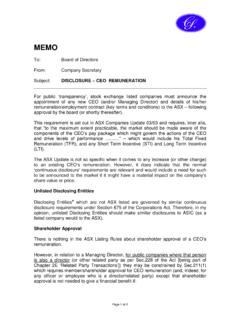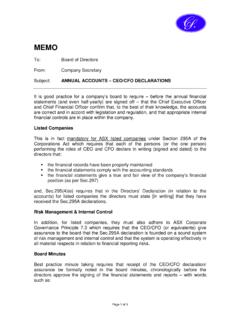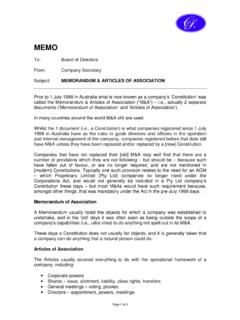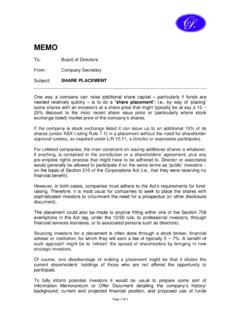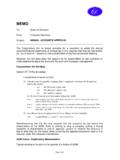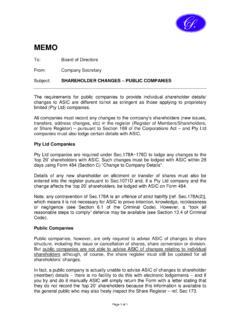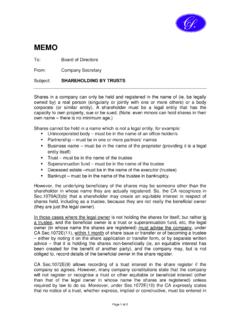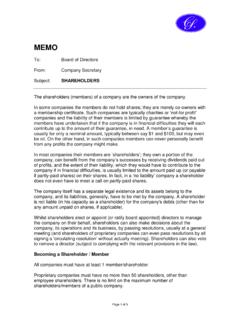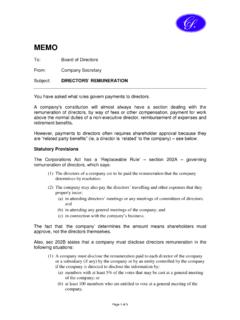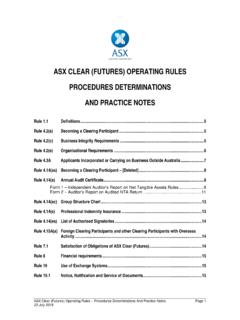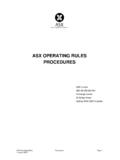Transcription of Company Formation by Foreigner Shareholder
1 Page 1 of 2 MEMO To: Board of Directors From: Company Secretary Subject: Company Formation BY FOREIGN Shareholder Below is my response to your comments/questions. The basic form of Company in Australia is a proprietary Company limited by shares (ie, it has Pty Ltd at the end of its name). However, a public Company can be formed in need, and whilst it may offer benefits over a proprietary Company , it also has more costly/onerous compliance and reporting obligations. A foreign person/ Company can incorporate a new Company in Australia, or register a foreign Company (ie, as a branch). Establishing a new Company is relatively straight forward. Details we would need as a minimum are: Proposed Company name (in need, this can be reserved in advance with ASIC) Names of proposed director(s) must be at least 1 Australian resident Name of Company Secretary if you want one, must be Australian resident preferable but not obligatory for a Pty Ltd Company Location of Registered Office and Principal Place of Business Details of initial share capital and holder name/address minimum 1 share required, usually paid up to say $1 although theoretically no paid up amount is necessary*.
2 On the other hand, registration of a foreign Company (as an Australian branch) is more complex and costly, but suits some corporations. To proceed with incorporation of a new Company please complete the following: Application detailing specifics of the Company Form 201 which will be lodged with ASIC Director(s) consent (and Company Secretary s consent, if required) Registered Office consent, if not the Company s own premises Share application. The new Company may have its own Constitution, but if you can prefer you can rely on the Replaceable Rules contained in the Corporations Act. Page 2 of 2 An Australian Company may have a single Shareholder . If that single Shareholder is another corporate entity, then the new Company is a wholly-owned subsidiary of the parent Company and the parent Company is the Ultimate Holding Company which must be recorded on the Form 201 when incorporating a new Company (and, if subsequent to Company Formation , then via Form 484).
3 The parent Company can be a foreign Company , which can own 100% of the shares in an Australian Company . There is no requirement for an Australian Shareholder . I do not know what you have planned, but some foreign investments (eg, real estate of any value and most other businesses/industries of $10m+) must first be approved by the Foreign Investment Review Board. Also and I guess this is getting into operational/regulatory matters (ie, beyond merely establishing a new Company ), which I am not necessarily qualified to advise on, and you may have to seek appropriate professional advice at some future time because there could be a myriad of issues to be considered as a foreign owned Company (legal, accounting, tax, etc) but the requirements for a foreign-owned small proprietary Company (ie one where at least 2 of the following criteria are satisfied: annual revenue less than $25m, assets of less than $ , less than 50 employees) which I presume you will be, at least initially, is that audited financial statements must be filed annually with ASIC unless relief is sought by directors resolution and lodging a Form 384 at least 3 months before the end of the Company s financial year.
4 If the Company is a large proprietary or public Company then it has its own obligation to lodge audited annual financial statements with ASIC, whether foreign-owned or not. The financial year-end can effectively be any date the directors resolve within the first 18 months after the Company is formed, but thereafter cannot be altered without ASIC consent. Most Australian companies chose 30 June as that is also the tax year-end. I trust this is sufficient to enable you to proceed. * Note, in Australia we no longer have authorised capital (as they still do in the UK, at least) nor do shares have a par value any longer directors just issue shares as required, for whatever amount they like. So, you can issue say 1,000 shares now (at any issue price you like) and more when necessary. Usually shares are just issued as/when required depending on the extent to which directors wish to capitalise the Company .
5 Of course, this can conceptually vary if there are other shareholders, pre-emptive rights, shareholders agreements, etc, which can, amongst other things, regulate new share issues, etc. To maintain an equity interest with more than one Shareholder you can also have partly paid shares, grant options, etc, etc. DISCLAIMER The comments in this memo reflect some commercial aspects and observations on the matter experienced or observed by the writer in practice as he understands them. The information is given as a guide only and does not represent a definitive or legal view of any of the issues raised, covered or referred to and the reader is urged to seek his own professional advice on all aspects of, or pertaining to, this and any related matter. Copyright Company Secretarial Services Pty Ltd ABN: 41 074 535 345
